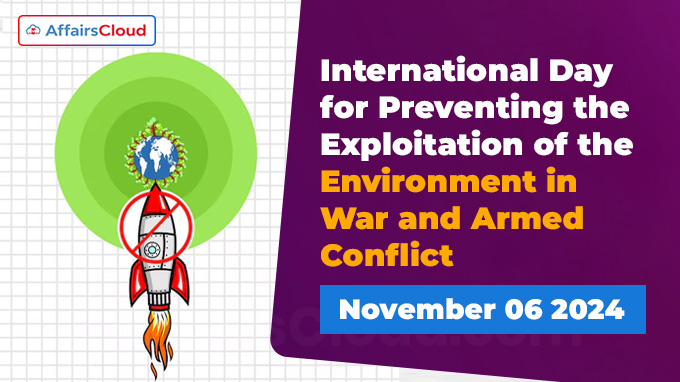 The United Nations (UN)’s International Day for Preventing the Exploitation of the Environment in War and Armed Conflict is annually observed across the globe on 6th November to raise awareness about the consequences that war and conflict have on the environment.
The United Nations (UN)’s International Day for Preventing the Exploitation of the Environment in War and Armed Conflict is annually observed across the globe on 6th November to raise awareness about the consequences that war and conflict have on the environment.
- 6th November 2024 marks the 23rd observance of the International Day for Preventing the Exploitation of the Environment in War and Armed Conflict.
Background:
i.The United Nations General Assembly (UNGA) adopted the resolution A/RES/56/4 on 5th November 2001 and declared the 6th November of every year as the International Day for Preventing the Exploitation of the Environment in War and Armed Conflict.
ii.The first International Day for Preventing the Exploitation of the Environment in War and Armed Conflict was observed on 6th November 2002.
iii.On May 27, 2016, the United Nations Environment Assembly (UNEA) adopted a resolution UNEP/EA.2/Res.15 recognizing that healthy ecosystems and sustainable resources can help reduce the risk of armed conflict and reaffirmed its commitment to fully implementing the Sustainable Development Goals set in the 2030 Agenda for Sustainable Development
Environmental Exploitation:
According to the United Nations Environment Programme (UNEP), over the past 60 years, at least 40% of all internal conflicts have been linked to the exploitation of natural resources.
- This exploitation includes pollution of water wells, forest fire, deforestation, poisoning of soils, and killing animals to gain military advantage.
Partnerships:
i.Six UN agencies and departments coordinated by the UN Framework Team for Preventive Action, have partnered with the European Union (EU) to assist nations in recognizing, averting, and resolving tensions over natural resources.
- The agencies are UNEP, United Nations Development Programme (UNDP), UN Human Settlements Programme (UNHABITAT), Peacebuilding Support Office (PBSO), Department of Political Affairs (DPA), UN Department of Economic and Social Affairs (DESA).
ii.The Environmental Law Institute (ELI), UNEP, and the Universities of Tokyo and McGill initiated a global research programme to gather good practices on managing natural resources during post-conflict peacebuilding.
iii.UNEP, UNDP, PBSO and the United Nations Entity for Gender Equity and the Empowerment of Women (UN Women) have collaborated to improve the understanding of the relationship between women and natural resources in conflict-affected settings.
- The first outcome of the collaboration is a joint policy report “Women and Natural Resources Unlocking the Peacebuilding Potential”.
About the United Nations Environment Programme (UNEP):
Executive Director– Inger Andersen
Headquarters – Nairobi, Kenya
Established – 1972




